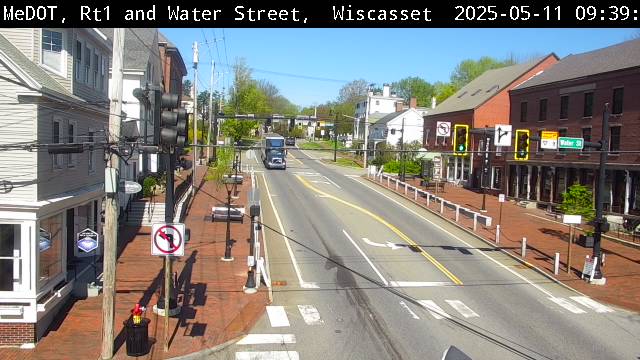Wiscasset, Maine Weather Cams
Wiscasset Airport FAA Cam
US-1 Traffic Rt1 at Water St Cam

Rt1 at Rt27 Traffic Cam

Wiscasset, Maine: A Coastal Town with a Storied Past
Wiscasset, Maine Weather Cams. Wiscasset, Maine, often referred to as “Maine’s Prettiest Village,” is a historic town located in Lincoln County along the tidal Sheepscot River. With a rich maritime heritage, early colonial roots, and a reputation for its well-preserved architecture, Wiscasset has played a significant role in Maine’s history.
Indigenous Presence and Early European Settlement
The Wiscasset area was originally inhabited by Indigenous peoples, who relied on the river and coastal environment for fishing, hunting, and trade. European exploration began in 1605, when Samuel de Champlain is said to have landed in the area and exchanged gifts with the local Indigenous population.
European settlers first established a community in 1660, but conflicts during the French and Indian Wars and King Philip’s War (1675) forced them to abandon the settlement. The town was resettled around 1730, and in 1760, it was incorporated as Pownalborough, named after Colonial Governor Thomas Pownall.
The Revolutionary War and Fort Edgecomb
During the American Revolutionary War, Wiscasset played a strategic role. The British warship Rainbow harbored itself in Wiscasset and held the town at bay until residents provided essential supplies. In 1775, Captain Jack Bunkerfamously robbed the payroll of a British supply ship, the Falmouth Packet, which was stowed in Wiscasset Harbor. He was chased for days and eventually caught on Little Seal Island, though his treasure was never found.
To protect Wiscasset Harbor from future threats, Fort Edgecomb was constructed in 1808 on the opposite bank of the Sheepscot River. The fort remains a historic landmark today.
Maritime Industry and Economic Growth
By the late 18th and early 19th centuries, Wiscasset had become a thriving deep-harbor shipping port, making it the busiest seaport north of Boston. The town prospered through shipbuilding, fishing, and lumber trade, leaving behind fine examples of Federal-style architecture, including Castle Tucker and the Nickels-Sortwell House, both of which are now museums operated by Historic New England.
However, Wiscasset’s fortunes declined after the Embargo Act of 1807, which halted trade with England. The town’s economy suffered, and much of its maritime business was lost.
Wiscasset’s Role in Maine’s Statehood and the Civil War
When Maine became a state in 1820 as part of the Missouri Compromise, Wiscasset was considered as a potential state capital. However, its proximity to the ocean led officials to choose Augusta instead.
During the Civil War, many Wiscasset residents joined the 20th Maine Volunteer Infantry Regiment, which fought bravely at the Battle of Gettysburg.
Historic Preservation and Modern-Day Wiscasset
Wiscasset has remained committed to preserving its historic charm. The town is home to the longest continuously operating courthouse in the country, as well as the 1811 Jail and Museum, which is maintained by the Lincoln County Historical Association.
The town’s downtown area is considered a living field museum, with numerous buildings listed on the National Register of Historic Places. The Wiscasset Library, Town Common, Sunken Garden, and Ancient Cemetery all contribute to the town’s historical significance.
Tourism and Local Attractions
Today, Wiscasset is a popular tourist destination, known for its early architecture, waterfront views, and local seafood. One of its most famous landmarks is Red’s Eats, a roadside seafood shack that has gained national recognition for its lobster rolls.
Visitors can explore Fort Edgecomb, tour historic homes, and enjoy the scenic beauty of the Sheepscot River. The town also hosts seasonal events that celebrate its maritime heritage and colonial history.
Conclusion
Wiscasset’s history is a testament to resilience, adaptation, and coastal heritage. From its early Indigenous roots to its role in maritime trade, the Revolutionary War, and Maine’s statehood, the town has remained a vital part of New England’s history. As preservation efforts continue, Wiscasset will undoubtedly remain a treasured landmark for generations to come.
For more information, visit the Wiscasset, Maine official website.
